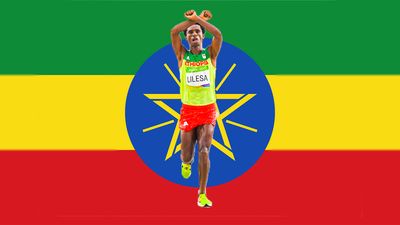Exclusive Interview with Ethiopian Marathon Runner in Exile, Feyisa Lilesa
Rio 2016 silver medalist and Ethiopian marathon runner, Feyisa Lilesa, speaks with Okayafrica on his political exile.
As he enters the ballroom of a tiny Washington hotel with his wrists crossed in an “X,” Feyisa Lilesa, Ethiopian marathon runner, Olympic silver medalist, and now, political exile, is welcomed with a burst of applause from Ethiopians present.
Lilesa made international headlines last month when he crossed the finish line with hands raised in the “X”—a gesture common among the protesters in Oromia—a region in Ethiopia where hundreds have recently been killed by government security forces. Although the Oromo are Ethiopia’s largest ethnic group, they have been historically marginalized from political power. In recent months, tensions have risen as a government development has taken over Oromo farmland.
For such a small gesture, it had a big effect. Lilesa’s audacious protest on the world’s biggest stage was a plea to the international community to acknowledge the Ethiopian government’s persecution of the Oromo ethnic group. Now, in Washington, he is in the midst of a media blitz as he demands the world’s attention.
But his actions do not come without a steep cost: he leaves behind his wife, five-year-old son and three-year-old daughter in Ethiopia, and risks death or imprisonment if he returns home. Now an indefinite political exile, Lilesa has come to the United States on a special skills visa to allow him to train and compete.
Okayafrica spoke to Lilesa through an interpreter about the plight of the Oromo, and his mission to keep fighting oppression in Ethiopia.
Akinyi Ochieng for Okayafrica: When did you first decide you would protest the Ethiopian government’s actions at the Olympics? Were you afraid of the consequences?
Feyisa Lilesa: Three months before the Olympics, the Ethiopian Sports Federation selected the finalists. Once I became a finalist, I decided to use the opportunity—when I would have millions of eyes watching me—to protest.
As I prepared to go to Rio, my legs were running, but my mind was also racing as I thought about all the killing and suffering around me. But I did not feel any fear because I knew it was the right thing to do.
Have your family or friends been affected by the violence in Oromia?
I have relatives that have been imprisoned, and a friend who was recently killed when a prison housing opposition activists was burned on the outskirts of Addis Ababa earlier this month. I can’t even count on two hands how many people I know who have been impacted by the oppression of the government.
Was your family supportive of your choice to protest at the Olympics?
They didn’t know what I was going to do. If they did, they probably would have stopped me. And it’s likely I would have been swayed by their pleas.
Tensions in Oromia have simmered for years and have come to a head with recent clashes between government security forces and Oromo civilians. In your opinion, what’s the root of these protests?
Oromos have been oppressed for decades. Their land has been taken from them without compensation. They have no control over their resources. They have no voice. Many have left their homes to seek refuge in other countries, and have died trying to cross the Mediterranean.
If this situation continues, I have no doubt that Ethiopia is staring into the abyss and faces a future of tragedy. The potential for ethnic conflict to erupt grows each days and could echo
All we want is for our human rights to be respected like anyone in any other nation.
The Ethiopian government says you’ll be welcomed home. You’ve voiced concerns that you’ll be killed or imprisoned. Why don't you believe them?
The Ethiopian government just wants to save face in the international community. Time and time again, they do one thing and say something else. For that reason, I don’t trust them. They’ve killed people for doing just what I did.
In Libya, Gadaffi didn’t kill as many people as the government has killed in Ethiopia, yet the international community rushed in to save the Libyans and has been silent in Ethiopia. Even if they don’t know the details, they must have some basic knowledge—must have witnessed the protests carried out by the members of the diaspora.
When’s the next time you hope to see your family?
It’s still a whirlwind at the moment. I’m still trying to figure out what’s next. I just got my visa, but I’m hoping to go back to training.
The protests are increasing in intensity with each passing day, and the people are raising their voices louder, so I believe that the government may fall soon and I may soon be able to go home to my family.
The current constitution is actually a great constitution. The problem is that nothing in it is protected. If the people actually had power and the corrupt government was to collapse, Ethiopia could be a very strong economy and be wealthy. Ethiopia is known to the world as a poor nation, but it doesn’t have to be that way.
Why did you decide to pursue a special skills visa instead of seeking asylum?
What I wanted is freedom. Here in the United States I am safe and able to use my running skills to earn a living through competition. As long as I have a visa that enables me to work, I don’t see a reason to seek asylum. I love my country and I look forward to going home once there is freedom and change.
